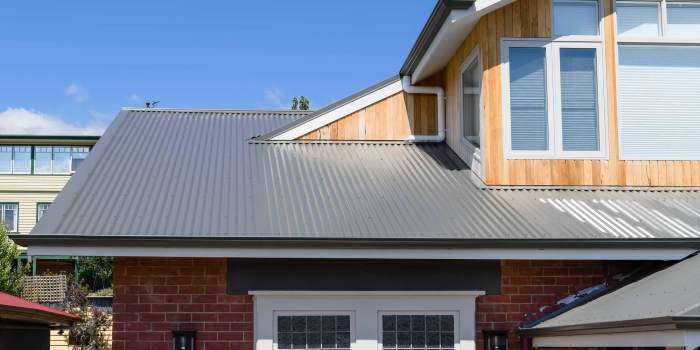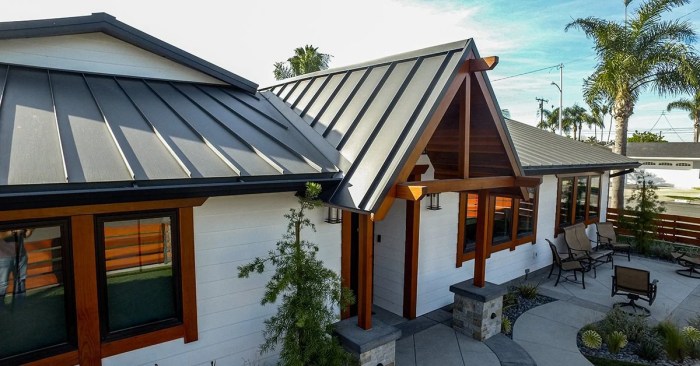Metal Siding Contractors: The Key Players in Construction
Metal siding contractors play a crucial role in the construction industry, bringing expertise and precision to projects that require durable and aesthetically pleasing metal siding solutions. From commercial buildings to residential homes, the work of these specialized contractors is evident in every corner of our cities.
Let's delve into the world of metal siding contractors and explore the intricacies of their craft.
Importance of Metal Siding Contractors

Metal siding contractors play a crucial role in the construction industry, specializing in the installation, repair, and maintenance of metal siding for various structures. Their expertise and skills are essential for ensuring the durability, functionality, and aesthetic appeal of buildings.
Specialized Expertise
Metal siding contractors possess the specialized knowledge and experience required to work with different types of metal siding materials, such as aluminum, steel, and copper. Their expertise allows them to recommend the most suitable materials for specific projects, taking into account factors like weather conditions, building design, and budget constraints.
Quality Installation
Hiring specialized metal siding contractors is crucial for ensuring the quality installation of metal siding on buildings. Improper installation can lead to issues like water infiltration, corrosion, and structural damage. Metal siding contractors follow industry best practices and standards to deliver high-quality workmanship, ensuring that the siding is installed correctly and securely.
Project Impact
Metal siding contractors have made a significant impact on various projects, ranging from residential homes to commercial buildings. Their work not only enhances the appearance of structures but also improves their energy efficiency and longevity. For example, metal siding contractors have transformed outdated buildings into modern, energy-efficient spaces through the installation of insulated metal panels and cladding systems.
Skills and Qualifications
Becoming a successful metal siding contractor requires a unique set of skills and qualifications that are essential for the job. Let's delve into the specific requirements for this profession.
Necessary Skills and Qualifications
To excel as a metal siding contractor, individuals must possess a combination of technical skills, physical abilities, and industry knowledge. Some of the key skills and qualifications include:
- Experience in construction: A solid background in construction is crucial for understanding building structures, materials, and project requirements.
- Knowledge of metal siding materials: Familiarity with different types of metal siding materials, their properties, and installation techniques is essential.
- Attention to detail: Precision and accuracy are vital when measuring, cutting, and installing metal siding to ensure a seamless finish.
- Physical strength and stamina: The job of a metal siding contractor involves lifting heavy materials, working at heights, and standing for extended periods.
- Problem-solving abilities: Being able to troubleshoot issues and find creative solutions on the job is a valuable skill for metal siding contractors.
Comparison with Other Contractors
Metal siding contractors differ from other types of contractors, such as general contractors or electricians, in terms of their specialized focus on installing metal siding specifically. While general contractors oversee various aspects of a construction project, metal siding contractors specialize in the installation and maintenance of metal siding materials.
Certifications and Training Programs
Aspiring metal siding contractors can enhance their skills and marketability by obtaining certifications or completing training programs in metal siding installation. Some of the available options include:
- Certified Metal Siding Installer (CMSI): This certification program provides training on best practices for installing metal siding and ensures proficiency in the field.
- Apprenticeship programs: Joining an apprenticeship program through a construction company or trade organization can offer hands-on experience and mentorship in metal siding contracting.
- Manufacturer training: Some metal siding manufacturers offer specialized training programs for contractors to familiarize them with their products and installation techniques.
Types of Metal Siding

Metal siding is a popular choice for construction projects due to its durability, low maintenance, and versatility. There are several types of metal siding commonly used by contractors, each with its own unique characteristics and benefits.
1. Aluminum Siding
- Aluminum siding is lightweight and resistant to rust, making it a durable option for exterior cladding.
- Pros: Easy to install, available in a variety of colors, and relatively low cost.
- Cons: Can dent easily and may require frequent repainting.
2. Steel Siding
- Steel siding is known for its strength and longevity, providing excellent protection against harsh weather conditions.
- Pros: Extremely durable, fire-resistant, and requires minimal maintenance.
- Cons: More expensive than aluminum siding and can be prone to corrosion if not properly maintained.
3. Corrugated Metal Siding
- Corrugated metal siding features a wavy pattern that adds texture and visual interest to a building's exterior.
- Pros: Provides excellent water resistance, easy to install, and offers a modern industrial look.
- Cons: Limited color options and may not be suitable for all architectural styles.
4. Copper Siding
- Copper siding is a premium option known for its unique patina that develops over time, giving a distinctive appearance.
- Pros: Long-lasting, recyclable, and adds a touch of elegance to any building.
- Cons: Expensive upfront cost, requires professional installation, and can be easily damaged.
Examples of Projects:
For a modern office building with a sleek design, contractors may opt for corrugated metal siding to achieve a contemporary look while ensuring durability against the elements.
In historic renovations, copper siding may be chosen to preserve the building's traditional aesthetic and add a touch of luxury.
Installation Process
Metal siding contractors follow a specific step-by-step process during the installation of metal siding. Proper installation techniques are crucial for ensuring the durability and longevity of the siding. Here are some tips for a successful metal siding installation:
Preparation
Before starting the installation process, it is essential to prepare the area where the metal siding will be installed. This includes removing any existing siding, repairing any damaged areas, and ensuring that the surface is clean and smooth.
Measurement and Cutting
Accurate measurements are crucial for a precise fit of the metal siding panels. Contractors will carefully measure the dimensions of the area to be covered and cut the siding panels accordingly to ensure a seamless installation.
Installation of Panels
The metal siding panels are then installed starting from the bottom and working their way up. Each panel is secured to the wall using appropriate fasteners, ensuring that they are properly aligned and leveled.
Flashing and Trim Installation
To prevent water infiltration and enhance the overall look of the siding, contractors will install flashing around windows, doors, and corners. Trim pieces are also added to provide a finished appearance.
Sealing and Finishing
Once all the panels, flashing, and trim pieces are installed, contractors will seal the joints and seams to prevent water penetration. A final inspection is done to ensure that the installation is done correctly and the siding is secure.
Maintenance Tips
- Regularly inspect the siding for any signs of damage or wear.
- Clean the siding with a mild detergent and water to remove dirt and debris.
- Avoid using harsh chemicals or abrasive materials that could damage the finish of the siding.
Cost Considerations
Metal siding contractors offer a range of cost considerations that clients should be aware of before starting a project. From material costs to labor expenses, understanding the breakdown of these factors is essential for planning and budgeting effectively.
Metal Siding Cost Factors
- Material Costs: The cost of the metal siding material itself can vary depending on the type of metal chosen, such as aluminum, steel, or zinc.
- Labor Costs: The installation process requires skilled labor, which can impact the overall cost of the project.
- Additional Materials: Other materials such as insulation, fasteners, and sealants may be needed, adding to the total cost.
- Size of the Project: The size of the area to be covered with metal siding will also influence the overall cost.
Comparison with Other Siding Materials
Metal siding installation costs can vary compared to other siding materials like vinyl, wood, or fiber cement. While metal siding may have a higher upfront cost, it is often more durable and requires less maintenance, potentially leading to cost savings in the long run.
Providing Cost-Effective Solutions
Metal siding contractors can offer cost-effective solutions to clients by optimizing material usage, minimizing waste, and streamlining the installation process. By providing accurate estimates and transparent pricing, contractors can help clients stay within budget while delivering high-quality results.
Closure

In conclusion, metal siding contractors are the unsung heroes of the construction world, ensuring that structures are not only protected but also visually appealing. Their skills and dedication shine through in every project they undertake, making them an invaluable asset to any construction team.
As we continue to witness the evolution of building materials, the expertise of metal siding contractors will remain a cornerstone of innovative and sustainable construction practices.
FAQ Guide
What makes metal siding contractors essential in construction projects?
Metal siding contractors bring specialized skills and experience to ensure the proper installation and maintenance of metal siding, which is crucial for the longevity and aesthetics of buildings.
What are the typical qualifications needed to become a successful metal siding contractor?
To excel as a metal siding contractor, individuals usually need a combination of technical skills, experience in construction, and possibly certifications in metalworking or siding installation.
How do the costs of metal siding installation compare to other siding materials?
Metal siding installation costs can vary but are generally higher upfront compared to some other siding materials. However, the durability and low maintenance of metal siding can result in long-term cost savings for property owners.




